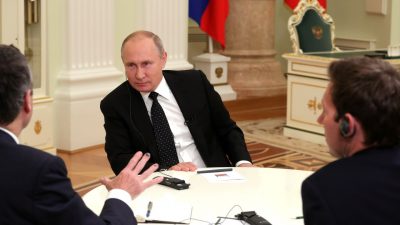Vladimir Putin: A Social Conservative Leader?

The Russian leader reminded the world of his original appeal as one of its socio-conservative leaders during an interview that he gave to the Financial Times late last week in which he spoke out strongly against liberalism and staunchly defended traditional values.
Part of President Putin’s original appeal worldwide was that he was one of the first socio-conservative leaders of a Great Power in the 21st century, though Trump’s meteoric rise to power and characteristic showmanship eventually overshadowed the soft power attractiveness of the Russian leader. As if on cue, Putin took the opportunity to proudly display his socio-conservative credentials during an interview that he gave to the Financial Times last week ahead of the G20. While a myriad of topics were covered during this extensive discussion, the most intriguing insight that he shared was about the present state of affairs in the West, which will undoubtedly attract the attention of the audience in that part of the world where his international reputation has been under the most ferocious attack.
Putin explained Trump and his fellow right-wing European allies’ tremendous popularity as being attributable to the prevailing notion among the population that “the ruling elites have broken away from the people”, which has caused “the obvious problem” of an enormous “gap (developing) between the interests of the elites and the overwhelming majority of the people.” The response of the European elites to the 2015 Migrant Crisis, inspired by “the so-called liberal idea which has outlived its purpose”, exacerbated this growing divide and brought the situation to the tipping point where “many people admitted that the policy of multiculturalism is not effective and that the interests of the core population should be considered.” Tapping into the veins of populism, Putin then described Merkel’s “refugee” policy as her “cardinal mistake”.
He elaborated by lambasting the “open door” policy for ignoring the problems of illegal migration and narcotics trafficking, crediting Trump’s controversial efforts to build a wall along the Mexican border as at least being an attempt to confront this global challenge. “As for the liberal idea”, Putin continued, “its proponents are not doing anything”, after which he proceeded to mock them by remarking that “they say that all is well, that everything is as it should be. But is it?” He added that “They say they cannot pursue a hardline policy for various reasons. Why exactly? Just because. We have the law, they say. Well, then change the law!” Putting his money where his mouth is, Putin then explained the approach that Russia is employing to address these threats.
In his words, “we are now working in the countries from which the migrants come, teaching Russian at their schools, and we are also working with them here. We have toughened the legislation to show that migrants must respect the laws, customs and culture of the country.” All of this is true and actually of immense importance too because “Be It From Birthrates Or Migration, Russia’s About To Greatly Increase Its Muslim Population” so it needs to be able to successfully continue assimilating and integrating “civilizationally dissimilar” individuals into its historically cosmopolitan society. Speaking of which, that said society is firmly rooted in strong traditions that emphasize the positive influence of religion in everyday life, just like the West used to be like before the advent of liberalism.
Putin thinks that “[religion] should play its current role” and that “it cannot be pushed out of this cultural space. We should not abuse anything.” Commenting on the countless scandals plaguing the Catholic Church, he warned that he “gets the feeling that these liberal circles are beginning to use certain elements and problems of [this institution] as a tool for destroying the Church itself”, which he “considers to be incorrect and dangerous”. Even so, despite his harsh critique of liberalism, Putin thinks that a balance must be struck between it and traditionalism since he’s of the belief that “purely liberal or purely traditional ideas have never existed”. Going further, he said that
“various ideas and various opinions should have a chance to exist and manifest themselves, but at the same time interests of the general public, those millions of people and their lives, should never be forgotten.”
That last comment is bound to win him some more supporters in the West, who have grown disillusioned with their mostly liberal leaders and the disconnect that they have with the majority of the population. Altogether, Putin’s reaffirmation of his status as one of the world’s leading socio-conservative leaders couldn’t have come at a better time since Russia and the US have begun the long process of clinching a “New Detente” with one another, so it helps to improve his image abroad and partially “rehabilitate” him during in the event that this this grand rapprochement eventually succeeds. As such, it was very important for Putin to trumpet his socio-conservative credentials and show that he relates to the concerns of the average Westerner nowadays.
*
Note to readers: please click the share buttons above or below. Forward this article to your email lists. Crosspost on your blog site, internet forums. etc.
Andrew Korybko is an American Moscow-based political analyst specializing in the relationship between the US strategy in Afro-Eurasia, China’s One Belt One Road global vision of New Silk Road connectivity, and Hybrid Warfare. He is a frequent contributor to Global Research.
Featured image is from Kremlin.ru

